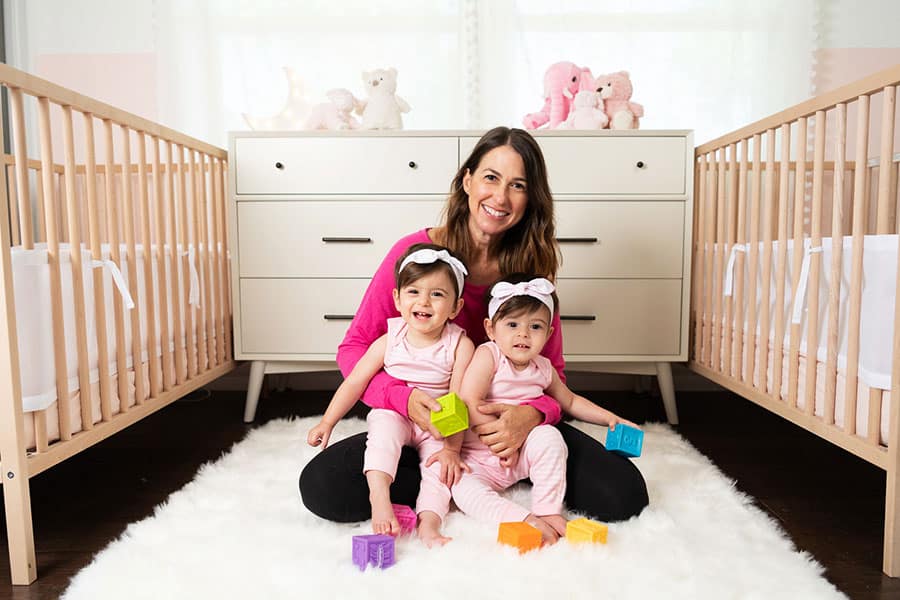Jessica knew she wanted to have a child, so she decided to try in vitro fertilization with donor sperm to achieve her dream. She got pregnant the first time the fertilized egg was implanted, and she couldn’t be more thrilled.
At her 8-week ultrasound, it was discovered that Jessica was having twins. The ultrasound technician suspected she was having monoamniotic twins, which was later confirmed at a perinatologist visit. Monoamniotic twins, also called “Mono Mono” twins, share the same amniotic sac and placenta, but have two separate umbilical cords, which made Jessica’s pregnancy high-risk due to potential complications. “Mono Mono” twins are rare – occurring in 1 in 35,000 to 1 in 60,000 pregnancies.
After research and discussions with her doctor, Jessica knew she would need to be hospitalized for several weeks prior to delivery. “My doctor and I decided it would be best if I delivered at MemorialCare Miller Children’s & Women’s Hospital Long Beach,” says Jessica. “My doctor told me that the twins would need to go to the Neonatal Intensive Care Unit (NICU) after birth. Miller Children’s & Women’s offered a Perinatal Special Care Unit for me, and a NICU for my girls. This decision kept us together at the same hospital through the entire journey.”
At 26 weeks, Jessica was admitted to the Perinatal Special Care Unit at the Cherese Mari Laulhere BirthCare Center. The Perinatal Special Care Unit offers advanced and continual fetal heart tracing through a state-of-the-art central monitoring system. The goal of the Perinatal Special Care Unit is to help baby’s continue to grow in the comfort of the womb for as long as possible. While Jessica was in the Perinatal Special Care Unit, there was another mom hospitalized with “Mono Mono” twins.
“We became friends fast,” says Jessica. “The nurses said they had never seen two families with monoamniotic twins at the same time. We were able to share our experiences and offer each other an additional level of understanding.”
At 30 weeks and 1 day, Jessica had an emergency Cesarean section. Ivy and Jane were born weighing just over 6 lbs. combined – Ivy was 3 lbs. 3 oz. and Jane was 2 lbs. 3 14 oz. – and were immediately taken to the NICU – just down the hall from operating room. Since they were so small, they were cared for in the Small Baby Program, which is a designated area within the NICU that mimics the environment of the mother’s womb.
“The Small Baby Program’s distinct approach uses gestational age to provide evidence-based medical and developmental care in a nurturing and supportive way to maximize a baby’s potential and minimize their risk for complications,” says James Fritzell, M.D., director, Small Baby Program, Neonatal Intensive Care Unit, Miller Children’s & Women’s. “This environment allows for developmental well-being and strengthens the bonds and understanding of the family unit. When not in the nurturing arms of their parents, premature infants are in an environment that matches their neurosensory and developmental needs.”
Ivy and Jane spent 56 days in the NICU. While they didn’t have any major procedures in the NICU, they both were on Bubble CPAP. Bubble CPAP (continuous positive airway pressure) helps infants in the NICU maintain lung volumes while breathing. Since the girls were born early, their lungs weren’t fully formed, and the Bubble CPAP helped them breathe as they continued to grow.
Today, at 1-year-old, Ivy and Jane are thriving. They’ve had some procedures since they have left the NICU, but they have recovered and are completely on track with their development. Twins can often be an overwhelming thought for families, but throughout their entire journey at Miller Children’s & Women’s, Jessica, Ivy and Jane learned the power of twinning.


